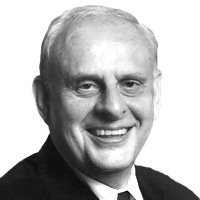
When President Obama concluded his news conference Thursday on health care and began to walk from the podium, a question rang out: “What about our troops?” I didn’t hear the answer, and I’m sure Mr. Obama is preparing a message for them. But the question startled me because in the day’s bustle, I had forgotten them, those who deserve to be remembered every day and certainly on Christmas Day and throughout the holidays, when we bask in our good fortune and our families.
There are hundreds of thousands of soldiers, sailors, airmen and airwomen, marines, coast guards, active duty personnel, and reserve and national guards serving the world over. They are in Japan, South Korea, the Middle East, Europe, and in and around Africa. There are legions more in America. They are almost everywhere and prepared to go anywhere. Especially, they are in Iraq and Afghanistan, fighting and sacrificing because their country—we and our leaders—said we needed them to protect us, to leave their families and their peaceful lives for our security, our values, our way of life. And they had slipped from my mind until I heard that question ring out Thursday morning, “What about the troops?”
I’ve been to the service academies many times before: what I saw once again was special.
• Kenneth M. Pollack: Could We Still Lose Iraq? • Bruce Riedel: Fighting the Same War Twice in Afghanistan? The worst of it was that they were very much on my mind, especially these last several weeks. I just spent several terrific days with the cadets at West Point (under Lt. General “Buster” Hagenbeck) and the midshipmen at the U.S. Naval Academy in Annapolis (under Vice Admiral Jeff Fowler) giving speeches and teaching classes. Next to being with troops in the field, there’s nothing like these experiences to appreciate our nation’s good fortune. They’re both inspiring places.
(Forgive my not mentioning the Air Force and Coast Guard Academies and the various Marine schools, but I haven’t visited them recently.)
I’ve been to the service academies many times before: what I saw once again was special. The young men and women (of whom there are now many) at both academies stand among the smartest, most forthright and most dedicated in our nation. They’ll ask their questions straight out. They’ll say what they feel straight out.
Afghanistan was very much on their minds. Of course, many were disappointed in President Obama’s decision to send only 33,000 additional troops to Afghanistan, joining the almost 70,000 already there. General Stanley McChrystal, the NATO commander, asked for at least 40,000, and most of these fighters-to-be believed their comrades-to-be required the maximum fire power.
At the same time, they understood this decision was not theirs to make. It was the President’s decision, and they would salute, obey, and serve. I heard not a bitch or a sneer, just a readiness to do what was asked of them for their nation’s security, for our security. They reminded me so much of the America I grew up in, as a kid during World War II, of Americans I cherished, of those who would make duty and country work for them, figure it out, stop the damned political arguments, the endless political bloodbaths, and just do their duty and make their sacrifices. Not a complaint did I hear.
And make no mistake, they are among our country’s finest in intelligence and character. They could have been anything—the most successful bankers, lawyers, businesspeople, whatever took talent, ambition, and discipline. And many still will when their service years are done.
Soon, many of them will be out there—in Iraq and Afghanistan. They don’t feel they need to agree or disagree with the policy. But they sure want the policy to be serious, to be well thought out, to be based on real and genuine American security interests. They understand that people and experts can differ on these matters, and they’ll tolerate that better than the great majority of Americans. What they won’t tolerate—and shouldn’t have to tolerate—is a lack of preparedness, not having the right equipment, the necessary firepower and a workable strategy.
And above all, they won’t tolerate the political baloney, the twists and turns of policy, the rear-end coverings in response to political pressures. Nor do they want to feel that the nation that they are about to fight for is tearing itself apart politically. They want the President to consult widely and seriously on war policy, then make up his mind, explain his strategy clearly, and stick to his guns. The 110,000 still in Iraq and the almost 100,000 who will be in Afghanistan a year and a half from now, deserve no less. The cadets and midshipmen soon to join them deserve no less.
Let’s not send them off to battle with Washington hatreds filling their heads and with ideological bombshells increasingly exploding throughout America. Whatever America’s conflicts on health care or economic stimulus, let the troops know that where they are concerned, we are one. Remember that those who do battle for the rest of us are the best of us. How I wish I could serve with them.
Leslie H. Gelb, a former New York Times columnist and senior government official, is author of Power Rules: How Common Sense Can Rescue American Foreign Policy (HarperCollins 2009), a book that shows how to think about and use power in the 21st century. He is president emeritus of the Council on Foreign Relations.





